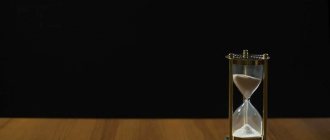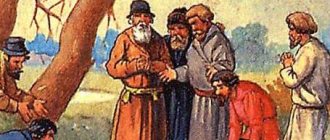Very often, cancer is preceded by the feeling that no one needs you, that you are not in demand either at work or in the family. And people who, during illness, struggle with this feeling and set specific goals outside of their illness, often, having overcome the illness, live richly and for quite a long time, says Alexander DANILIN, psychotherapist PND No. 23, host of the “Silver Threads” program on Radio Russia " He told Mercy about the psychosomatic causes of oncology and the possibility of overcoming the disease.
Statuses about illness and recovery
Many statuses about sick people are pessimistic, but most illnesses are curable. Therefore, do not be discouraged and it is best to be optimistic. Statuses about treatment and recovery will help do this.
- Nowadays people turn to doctors only to find out the diagnosis, and treatment is specified on the Internet.
- I dream that the sore throat will go away as soon as possible, otherwise I want to talk to anyone but can’t.
- Diseases are treated by doctors, but final recovery is provided only by nature.
- A person can overcome any illness if he does not give up.
- If drugs don't cure me, music will.
- Those who have no pain are happy ones. I’ve been hungry for a week now, but I can’t, I’m drinking hard - and it’s all because of a sore throat.
- The first seconds after the diagnosis I am sick, and the rest of the time I am recovering.
- I’m on the mend, I wish I could get there...
- If sleep helps, then my illness is not fatal.
- Treatment is more valuable than health.
- I only eat medications, and because of them, food doesn’t fit in my stomach.
- When there is hope of recovery, you are already half cured.
- The time would soon come when I would only need to go to the pharmacy for vitamins.
- Diseases help eliminate problems in the body, and medications only contribute to this.
- Physical illness can be compared to the taxes that life takes from us. Everyone has to pay, but the good news is that this almost always leads to recovery.
- If the disease is incurable, then it will have to be endured.
- Those who have recovered best understand the value of health.
Does it all start with the feeling that you are no longer the salt of the earth?
As a psychotherapist, I can talk specifically about psychosomatic problems, that is, about how mental experiences can cause one or another somatic reaction. Of course, any illness, even a simple cold, changes our life plans, sometimes significantly, sometimes not, and a person experiences some kind of anxiety. But these are already consequences, and psychosomatics considers all forms of cancer as the primary manifestation of a person’s reluctance to live. Reluctance internal, hidden, unconscious.
It is clear that cancer is not suicide, but there are many forms of human behavior that are essentially slow suicide. For example, binge drinking or smoking. Teenagers who start smoking secretly may not know, but any adult smoker knows that it is highly likely to lead to tumors, yet many continue to smoke.
Maybe something has changed now, but 10 years ago, when I regularly visited the oncology center, oncologists smoked a lot. When I came to the center, smoke was coming out of all the doors of the pulmonary department in clouds.
I am also a smoker, although I understand that I am taking a risk. How to explain the smoking of doctors who deal with the consequences of this habit every day? I think this is where the doctor’s ambitions lie. Like, I’m a doctor, I can overcome this disease in myself, everyone can’t, but I can. And there is undoubtedly an element of such ambition in my smoking. On the other hand, smoking is pseudo-meditation, an opportunity to withdraw into oneself. This is a separate topic, now I would like to talk about emotional experiences.
I came into close contact with oncology in the nineties of the last century, when almost all of my wife and I’s parents died from various types of tumors. As you remember, then life in the country changed dramatically. I noticed that many people then experienced fear (not despair, but fear), and I began to understand that my father, father-in-law, mother-in-law, somewhere deep down in their souls, did not want to live in the new world that was offered to them.
For most people, their status in life and self-identification are very important. This is especially important at our age, on average. We understand that life does not end yet, but begins to move toward sunset, and at this time it is especially important for a person to understand who he is, what he has achieved, whether he can indicate his status with the words: “I am a famous doctor” or “I am a famous journalist,” etc. .d. The word “famous” here has a great meaning for many - even if they hide it, people want such an adjective, meaning the measure of their influence, to exist.
Any existential problem can only be expressed in metaphor. For this situation, the words of Christ seem most appropriate to me: “You are the salt of the earth.” They sank into my soul from the first reading of the Gospel. I believe that cancer overtakes a person who begins to feel that he is no longer the salt of the earth.
We all know that salt adds flavor to food. But before the era of refrigerators, it also helped food preserve - there was simply no other way to preserve food. Therefore, in all cultures, salt has been a symbol of care. By exchanging salt, people emphasized their closeness and ability to preserve each other. So, when a person feels that his creativity, the fruits of his labor are not needed by anyone or that he has no one else to preserve, very often he develops a tumor.
For example, my grandmother was the keeper of a large family - I kept in touch with both my second and fourth cousins. She always felt like a keeper, and indeed after her death the family fell apart, and contact with many distant relatives was lost. That is, to feel like the salt of the earth, it is not necessary to be widely known or in demand, but at least at the level of the family, the closest people - parents, husband, wife, children, grandchildren or friends - everyone needs it. And I don't think it's appropriate to talk about pride. Cancer overtakes both the proud and the modest and humble people. I prefer the “salt of the earth” metaphor.
And it is very important for a person of a creative profession - a writer, an artist, a composer - to understand (even if he pretends that he doesn’t care) that he will be read, watched, listened to for a long time. Artists (in the broad sense of the word) who believe in this often live long, but those who hope that a written book, painting, or music will immediately bring fame often get sick and die relatively early.
Of course, some kind of kind feedback is needed at least from someone: from a wife, husband, children, from those with whom you have connections. But often in reality, especially today, everyone is so absorbed in their own affairs that they don’t even have time to say a kind word to another that even though he retired, we remember and appreciate his “role in history” - his contribution to science or art or caring for family.
Life statuses about illnesses
If you have started treatment and are temporarily unable to attend school or work, then illness statuses can explain your absence. Short phrases without unnecessary words will tell about your condition.
- Getting sick before the New Year is terrible... It’s like half your life is passing by.
- My nose is only supported by snot.
- If the patient wants to live, doctors are powerless.
- I feel myself, but very poorly.
- The most expensive things in the world are illness and stupidity.
- If treatment is not started on time, the disease may go away on its own.
- The illness was given to me so that I would think about whether I was going there.
- As I get closer to death, the disease reduces my desire for life.
- The disease is premature old age.
- People create their own diseases.
- With illness, the body subconsciously protects itself from my behavior.
- Take care of your health - you will need it.
- The outside is not as bad as it seems. When you're sick, everything is much worse.
- Through illness you can learn the value of health.
- When I’m sick, I don’t want anything at all, even what the doctors have forbidden.
- I will die - too late or too early.
- Health is much more valuable than gold.
- Autumn has just begun, and I’ve already turned into a snotty little thing.
- It is better to suffer illness a hundred times than to face death once.
Deadly spot. Melanoma - skin cancer
Irina Nikolaenko, oncologist at the regional clinic “Nadezhda”:
“Our patient once refused surgery on her face because she had a small spot. Well operable. And that would be the end of it. But she decided that after the operation there would be a scar on her cheek; of course, she did not want to have such a cosmetic defect.
Now the patient is 65 years old, the formation has grown so much that it has covered half of her face and affected the area around the eye. Now there is no way to remove it; the operation is simply technically impossible. Only radiation therapy, but whether it will help is a big question.
Another patient recently came in; two months ago she noticed an enlarged lymph node in the left groin. We examined her and found nothing in any organ, but, of course, we understood that this was a metastasis, and that there was a primary neoplasm somewhere.
And finally, a small pigmented formation was discovered on the left thigh, which the patient tried to remove with celandine two years ago! If she had turned back then, the formation would have been operated on, and no medications would have been required.
Disease. Doctor. Analyzes
CC0
How does the disease manifest itself?
- The formation can remain on the skin for many years. But if it ulcerates, crusts over, itches - that is, it is not just a pigment, but, roughly speaking, a “sore” - then it’s time to see a doctor.
For some reason, people have the belief that if age spots have been present since birth, then there is no need to touch them. We need to touch them. Anyway, watch. Especially in teenagers during hormonal changes.
If there was no stain at all and suddenly it appears, we also observe. If, against the background of an even color, inclusions of a lighter or darker color form, if the formation sharply increases in size and begins to bleed, this is an alarm signal.
How to treat
— In the early stages, the neoplasm is excised and the material is sent for histological examination. If it was a benign formation, then after its removal nothing more is required. If it is malignant, the patient will undergo a repeat operation: the scar at the site of the removed tumor is excised to avoid further spread.
Oncology Center.
Anna Zaikova.
Most often, melanoma affects the so-called regional lymph nodes - those that are closer to it. If the melanoma has already “progressed” further, it is often necessary to remove the lymph nodes in the armpits, groin, chest, neck and others.
Melanoma is a very malignant and very aggressive tumor; a person dies not from skin cancer, but from distant metastases, which can be literally in all organs.
What to do
— If you have any suspicions, go to a therapist or surgeon at your place of residence. People often turn to private medical organizations to remove age spots. Doctors there are also wary of skin cancer and may refer the patient to an oncology clinic.
That is, a person can contact us with a conclusion from a private clinic, bypassing the clinic at his place of residence.
If there is a pigment spot, then it is better to purposefully visit a dermatologist at least once a year. Doctors in the examination rooms of clinics are trained to look for external oncological manifestations in the mammary glands, oropharynx, and skin. From there they can refer you to us.
Doctor. Robe. Disease
CC0
Fact
Most often, malignant neoplasms are detected in urban residents - 58.3% versus 41.7%, respectively.
Statuses about support
There are special statuses about illness (sad). Without support, you shouldn’t expect quick relief from your illnesses, so sometimes it’s worth asking for it through social networks. Communication using statuses is quite common in them.
- Patients definitely need a doctor, but it is much more important to have someone who loves them nearby. Support is the best medicine.
- There is nothing more painful in illness than melancholy.
- We are together: me, you and the disease. Depending on whose side you take, the outcome will be determined.
- The main ally of the disease is the despondency of the patient.
- Physical illnesses are closely related to mental illnesses.
- Infected with the fear of disease, received the disease of fear.
- Late assistance to the sick later turns into tears.
- As soon as I got sick, I thought about who I needed to forgive.
- The worst thing is when a loved one feels bad, and you cannot help him with anything.
- Sometimes I want to be sick longer to feel loved and get at least a little attention.
- Illness is the best way to find out how dear you are to your loved ones and friends.
- It's so frustrating when you're sick and no one calls to see how you're doing.
- Often all it takes to recover is the support of a loved one.
- An easy way to find out who truly cares about you is to get sick.
- Pain is a product of emptiness; it can only be dealt with with someone’s help.
Denial and fear
Brake for immunity: why they gave the Nobel Prize in medicine
Scientists have found proteins that tumors secrete to locally suppress the body's defenses
In its pure form, cancerophobia is quite rare today, but it is often used to refer to any fears associated with cancer, explains Anna Kan, a clinical psychologist at the National Medical Research Center for Oncology. N.N. Blokhina”, who took part in the work on the project “#thiscannotcure”.
— There are not as many real cancerophobes, those who exhibit phobic symptoms, as it seems. “Cancerophobia” today is used rather as a brighter, literary word to denote increased anxiety associated with cancer, says the publication’s interlocutor.
In itself, such anxiety is not always bad. As long as it is manageable, it can be a good incentive to, for example, undergo an examination or go to the doctor, says the publication’s interlocutor. The problem arises when a person loses control over these emotions.
Photo: RIA Novosti/Alexey Sukhorukov
“If anxiety begins to develop into a panic state and instead of going to the doctor, a person stays at home, because anxiety tells him: “Don’t, in case they find you,” this is already considered uncontrollable anxiety,” explains Anna Kan, emphasizing, that in this case, nevertheless, we are not talking about a phobia.
Cancer hub: large medical centers are needed to defeat cancer
Doctors gave modern Russian oncology a “seven” on a ten-point scale
According to the World Health Association (WHO) website, delays in seeking medical help are among the most common problems associated with cancer.
This attitude, oscillating between denial and fear, is typical for people all over the world, explains Mikhail Laskov, oncologist, hematologist, candidate of medical sciences, head of the Doctor Laskov Clinic to Izvestia.
“Our society is very infantile, and people’s attitudes towards cancer are, accordingly, the same. This is a mixture of denial, fear and a huge number of myths on this topic. And this is true not only in Russia, but throughout the world. People don’t want to talk about it at first: “Oh, let’s not talk about it, why should I have cancer, we all died from heart disease.” And when it does happen, fear sets in,” he says.
Sad statuses about cancer
The worst thing is to find a status about an illness from a friend. Cancer is one of the common diseases that changes people's lives. If you suffered from it or, on the contrary, were cured, you can set the corresponding quote in your status to tell your friends about it.
- If you're sad, come see me in the hospital. One round of the cancer ward will give you motivation for the rest of your life.
- During a serious illness, there is always room for a miracle. Cancer has brought to the forefront the things I hold dear and love.
- When I was diagnosed with cancer, I wondered why me. I suspect that when remission occurs, I will be asking the same question.
- After being diagnosed with cancer, I lost two kilograms - I cried them out with my tears.
- There is no way to live without red blood cells.
- The worst disease is not the one that is fatal. The worst thing is that the disease is incurable.
- Don't feel sorry for me and don't let me give up. Dejection only gives cancer strength.
- When you are diagnosed with cancer, you are like in a battle where you cannot always win.
- I don’t want to think about cancer and its consequences, I don’t want to think at all - it’s just time to act.
- All my plans for life were ruined by just one word in the doctor’s office. This word is cancer.
- I don't want to become my own disease. Cancer is comparable to a business that consumes people, and you cannot give up on it ahead of schedule.
- Cancer is not a reason to wait for death. It gives you the strength to enjoy every day you live.
- With cancer there is still time to live, but with it there is no future.
- I know that there is no way to escape cancer, but that will happen later, not now.
Not everyone can change with life
The feeling that you have ceased to be salt appears in different situations: for some it is associated with retirement, for others with a work decline, a creative crisis. In the 1990s, when Yeltsin actually closed the KGB - large cuts were made there, some departments were liquidated - a huge number of “black colonels” found themselves outside the system, outside the office (they could be lieutenant colonels, and even majors, but that’s not the point ). They took care of them, offered to open companies or hired them as deputies in already opened ones, in general, as far as I know, they settled in quite well.
But there is a huge difference between the life of a colonel or lieutenant colonel in the KGB engineering department and the life of a director or deputy director of a company. The life of a director or deputy director of a company is constant bustle, running around, organizing, sales and resales, in general, all the delights of our so-called business. But not everyone can do this. In principle, not all. I don't know if I can. And then these people suddenly began to split into drug addiction and cancer patients - either they became drunkards, or they developed tumors.
Of course, not everyone got sick, but a lot of them – there was an outbreak, the oncologists themselves told me about it. The situation is clear. These people, almost the only ones in the country, lived, if not under communism, then certainly under socialism. From the very beginning of their service, they had a completely predictable career, a relatively short wait for an apartment, a car, vouchers to good sanatoriums - in general, clear and quite profitable rules of the game. They received not much more than ordinary Soviet employees, but thanks to the preferential supply system they were spared from the bustle of life on which we all spend a significant part of our time.
And suddenly they returned to this bustle against their own will. For many this turned out to be intolerable. It's not a matter of pride, it's not a matter of painful pride. I talked to many of them; some, of course, had pride, but not all of them. The problem is not rabid pride, but the fact that they did not fit into this world, could not understand the relationships in it. I had to change something in myself in order to become a new person - a member of the consumer society. Few people were able to cope with this task.
This is one example. My dad was a true Soviet believer. An engineer, non-party, he did not have any benefits, lived only on his salary, but sincerely believed that the Soviet government was the best in the world. Unmercenary, completely devoid of pride, always acted according to his conscience and taught me this.
And in the mid-1980s, when I was already living separately, he read Rybakov’s “Children of the Arbat”, which had just been published in Friendship of Peoples, called me at night and asked me, my 25-year-old son: “Sasha, did it really happen? Is what he writes true?”
He died of cancer. A world where the truth had turned 180 degrees, required a completely different person, a person of some other faith. Dad, unlike me, didn’t know what Christianity was, and treated it with humor. Such a healthy Soviet engineer. By the way, he was non-partisan, but believed in communism and Soviet power. I think he also faced the need to become completely different, because his plan of life - on 120 rubles - already at the end of the 1980s did not allow him to live and, as you understand, it did not allow him to live honestly, in harmony with his conscience.
Despite all the different destinies, both the “black colonels” and the pope required some rebirth. For example, I did a lot of things - oncopsychology, narcology, psychotherapy - but my education and experience are applicable in all these areas. There was never a need to change everything radically, to become different.
Most of those who came to my oncopsychology groups (we are now planning to continue this practice in Moscow PND No. 23), for various reasons, found themselves faced with the existential need to literally become different in order to get settled in this world (not in the material sense, but in the spiritual or psychological), but did not find the strength for this. And for me, as a psychotherapist (I’m not an oncologist), the main thing in cancer treatment is the goals that a person sets for the future beyond the boundaries of his illness.
It is clear that we are all mortal, moreover, this is necessary for our development and creativity. If we found out that we are immortal (I'm talking about earthly life), we would immediately stop. Why rush if we have an unlimited supply of time? I’ll write a book or a symphony later, someday, but for now I’d rather lie on the sofa.
Death is necessary for us to act. We have an indefinite, but definitely short period of time for us to become the salt of the earth. Therefore, the main thing in the treatment of oncology is to set some kind of goal.
Initially, there can be two goals: caring for other people or creativity, which inevitably includes this caring. Any creativity has meaning when a person creates for others, to give them beauty, to reveal to them something new about the world around them.
I think if there was a real Dorian Gray who put his life into a portrait, he would die of cancer. Because such creativity is fruitless. Creativity to the detriment of people, for example, the creation of a bomb or other weapons of mass destruction, also often has a detrimental effect on health. At least, among our and American bomb creators, many died of cancer, and I think that they got sick not only because of radiation.
Horror and confusion
Most patients, upon learning that they have cancer, become confused, Irina Borovova, head of the Hello oncology patients association, who herself has encountered breast cancer, tells Izvestia. Therefore, most often in the first time after the diagnosis has been made, people do not seriously assess their chances of cure.
Photo: RIA Novosti/Denis Abramov
“We conducted special monitoring on this topic, and the majority of respondents, more than 80%, wrote that their first thought was: “When will I die?” Almost no one thinks that he will be able to recover. That is, the first reaction is almost always the fear of death,” says Izvestia’s interlocutor.
For those wearing a mask: VR turned out to be a universal assistant
How virtual reality teaches humanity and relieves pain
These first emotions, according to her, most often lead to depression or apathy, and sometimes to the fact that a confused person, believing that traditional medicine is powerless against a disease, begins to look for salvation in alternative methods of treatment, wasting time that he could have spent to fight the disease.
The situation is aggravated by the fact that similar emotions - fear, confusion - are experienced by the patient’s loved ones, frightened by the prospect of his death. According to Irina Borovova, it is often friends or relatives who begin to convince a cancer patient to use dubious methods, the effectiveness of which has not been proven.
- It may be that a person has a chance to recover, for this he needs to undergo a certain course of treatment. But the man says: this doesn’t help, I read on the Internet, I’d rather, for example, eat red dry ants. Not that everyone says this, but it happens quite often, explains Mikhail Laskov.
Photo: TASS/Zuma/Alexey Sukhorukov
At the same time, almost everyone talks about using it as a supplement, says the doctor.
Russian startup offers emotion management
Virtual reality will be used to improve mood








